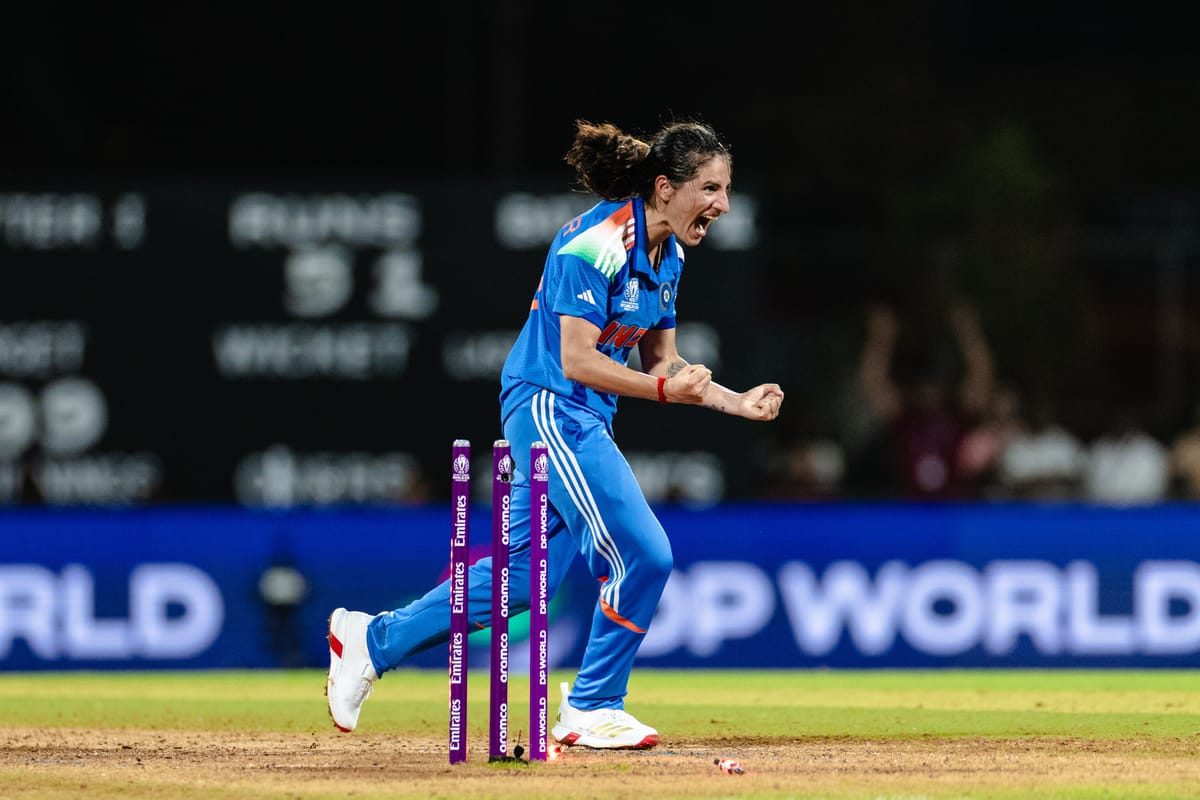A Cricket Win So Major, It Could Change Sport in India Forever
'The journalist in me was elated, the woman in me felt validated'—The Persistent sits down with the sports reporter Rica Roy as she reflects on the significance of India’s women’s World Cup win.

It’s hard to overestimate the importance of cricket in India. From the millions of kids playing on makeshift pitches in neighborhood parks to the packed stadiums and high-stakes glitz of the Indian Premier League, cricket is as close as the country gets to a national religion.
That’s why the victory of India’s women at the cricket World Cup this month was such a huge deal. The game was watched by an ecstatic crowd in Mumbai, and hundreds of millions of fans tuned in, matching top viewing figures for the men’s game. The team beat South Africa, the reigning champions, taking home the winner’s trophy for the first time in history.
Among those lucky enough to be there in person was Rica Roy, a queen of Indian cricket reporting. She would hardly have missed it. For Roy, sports editor for the Indian broadcaster NDTV and a veteran chronicler of the game for the last 20 years, the win symbolized decades of perseverance by sportswomen and the female journalists who had long championed their cause.
Just a decade ago, these players (who are now extremely wealthy by Indian standards) still needed to supplement their income with other jobs. And it wasn’t until 2022 that India’s cricketing authorities awarded them equal pay to represent their country.
A year later, the launch of the Women’s Premier League brought the kind of high-stakes money male players had long enjoyed. Then came the 2025 World Cup, played on home soil before crowds of expectant fans. For Roy, who’s often been the only woman in a room full of men, things felt different among those covering the sport as well as the players.
Roy spoke to The Persistent about what the women’s victory means, for her and for India. The conversation has been edited for length and clarity.
Tell us how your love for sports began and what first drew you to storytelling?
I’ve always loved sport. I grew up in a family that took great pride in its knowledge of both sports and politics. Sports were part of our everyday life and culture. I played a bit myself, but I knew early on that professional sport wasn’t going to be my path.
That part of my journey ended quite early when I met a wonderful mentor— journalist who worked with "Sportsworld." He introduced me to the world of sports journalism. I was about 12 when I wrote my first article for "The Statesman," an English daily.
I often call myself an accidental journalist because I never went chasing the profession. I actually studied science, and believe that background helps me bring structure to my work and life. But storytelling was always a powerful draw. And here I am, 25–26 years later, still weaving stories—not just about the game itself, but about the entire ecosystem around it.
When you began your career, what was it like for women in sports journalism? How has the landscape evolved?
When I first walked into sports journalism, there were very few women—hardly any role models to look up to. Even today, when I step into a media gallery, I often feel I have to be the best man in the room. Sports journalism in India has come a long way but still remains largely a man’s world. I wouldn’t say there’s been a complete paradigm shift yet. If you walk into a press conference and see 10 journalists, you’ll probably still find only one or two women among them.
During the Women’s World Cup, things felt different. I saw many more women stepping up to cover the game, driven by the energy and pride of telling a story about empowerment and equality. I was fortunate to witness that moment—when the collective energy of women came together, and India’s spirit shone brighter than ever. The women’s cricket team’s victory was nothing short of a fairy tale—a magical chapter in my own journey as a journalist.
Will this moment redefine the future of women’s sport?
This victory will bring major sponsorship and endorsement deals for some female players. While equal match fees for men and women sound fair, it’s complicated since women play fewer matches. Still, this win will create a ripple effect across sports, boosting the women’s sports ecosystem. More opportunities, infrastructure, and facilities must be built specifically for women—without viewing them through the lens of men’s sports. Women’s athletic strengths differ, and this moment offers a chance to redefine and expand the world of women’s sports.
How did this particular World Cup victory stand out for you?
When the Indian women’s cricket team won, it felt like a moment of absolute truth. It wasn’t just about that match, it was the culmination of years of hard work by generations of players, their families, and the journalists who consistently believed in the grit of female athletes. In the past, I often sensed a lack of self-belief among women cricketers: They would come heartbreakingly close to victory, sometimes within nine runs, yet fall short. But this time, they crossed the barrier. Watching it unfold, the journalist in me was elated, but the woman in me felt validated.
It was one of those rare moments when you simply want to pause and feel the euphoria—not just for the win, but for your own journey, your persistence, and everything that led to witnessing that historic triumph.





